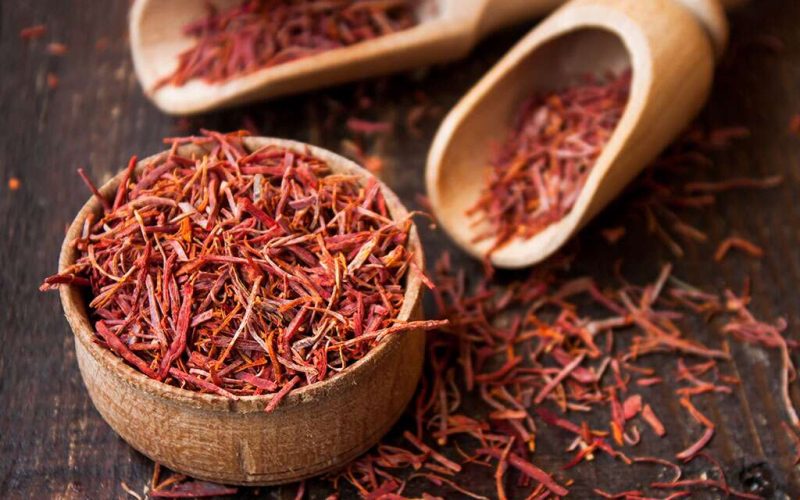When a woman gets pregnant, it means the beginning of both physical and mental transformations. At this point, many women’s craving food can go from normal to bizarre, depending on their mood.
Saffron during pregnancy is one delicacy that has caught the interest of many people, and we are going to discuss why.
Some experts maintain that taking saffron during pregnancy packs a lot of medicinal benefits. It also helps to promote positive emotion in pregnant women.
People who include saffron in their diet have admitted that the food has helped with stomach pain, stress, and lessen anxiety.
Notwithstanding, the “too much of everything” also applies to nutritious food, and it’s best to be taken in moderation. Below is all you need to know about saffron.
Saffron
Saffron can be characterized as the dried stigma of the flower known as Crocus Sativus. It is recognized as a thread-like structure with its pollen spotted in the middle of the flower. The plant produces four potent flowers, and a single one can provide three strands of saffron.
It is estimated that about 14,000 saffron strands can produce a pound of saffron, and plenty of effort is put into cultivating and harvesting the threads.
In fact, saffron is one of the priciest spices in the world, with cultivation mainly focused on the Mediterranean regions, India, and the Middle East.
The plant is also only grown in Kashmit & Jammu. This exotic plant is also known by other names such as saffron, zaffran, koung, Kesar, or kumkumapoovu. It is also referred to as the “Golden Spice.”
This is because it gives off a sweet aroma and helps with digestion by providing a protective coating inside the digestive tract.
The carotenoid pigment crocetin present in the food is identified by its yellow-orange coloration. Due to the spice’s soothing effects on our skin and the medicinal properties, it is also used in some beauty treatment products.
Pregnant mothers who include saffron in their diet can benefit from the spice’s antioxidant and anti-aging properties. Some people even believe that the consumption of saffron during pregnancy can lighten the complexion of the baby.
Is consuming saffron safe during pregnancy?
Fortunately, eating saffron during pregnancy is healthy and safe due to its numerous medicinal factors.
Also, the spice helps with mood swings, aches, pregnancy discomforts, stress, and anxiety. However, it’s also been discovered that too much consumption of saffron can be bad for health.
Excess consumption of saffron has been believed to stimulate contractions or even premature delivery.
These are things to consider before adding saffron in your food:
- Make use of two or three strands of the spice. Excess strands could affect the health of a pregnant woman.
- Saffron should only be taken during the 5th month of gestation. This is because the pregnancy is deemed safe, and the risk of endangering the child is very minimal compared to when it’s taken earlier.
- The spice should only be procured from reliable vendors. This helps to eliminate the risk of using artificial impurities or coloring.
Benefits of saffron during pregnancy
The spice is recommended for pregnant women due to its medicinal properties. Saffron helps with digestions by producing a protective sheet in the digestive tract.
With the spice eaten in moderation, some of the benefits pregnant women can get from it include:
Minimizes mood swings
Several hormonal changes are noticed when a woman is pregnant, and this can have a profound effect on a woman’s physical state. Most women can have their mood changed very quickly, and they can go from being cool to being erratic in one moment.
Pregnant women can take advantage of the spice’s anti-depressant properties. Saffron also helps to improve blood flow in the brain and secrete serotonin that improves the mood.
Controls blood pressure
The heart rate of a pregnant woman can go up by as much as 25 percent, causing inconsistency in blood pressure. Crocetin and potassium present in saffron can be used by pregnant women to reduce blood pressure.
Reduces morning sickness
It’s not uncommon for pregnant women to experience morning sickness. Anecdotal evidence has shown that tea made from saffron can be used to combat dizziness and nausea.
Helps with digestion
Most women suffer stomach pains during pregnancy, and most experience complications with digestions. Saffron can be taken to stimulate quick digestion during this period. The plant can help improve blood flow in the digestive tract, while also enhancing the body’s metabolism.
The spice can cause the formation of a coating that protects the digestive tract that helps to lessen bloating and calm gastrointestinal acidity.
Reduces cramping
Most pregnant women regularly complain of cramps that could range from mild to severe. During pregnancy, muscles and bones shift and stretch to house the rapidly growing baby. This discomfort can cause cramps and pain in the pelvic joints and stomach, but saffron can be used to numb the pain.
The spice can also be used to relax the muscles, which directly soothes pain and cramps.
Helps against heart disease
Saffron can be used by pregnant women to manage heart complications. It isn’t uncommon for many pregnant women to consume excess fatty food, especially when they can’t control their appetite. Situations like this can negatively affect the cardiovascular system in their body.
Nonetheless, the crocetin, antioxidants, and potassium abundant in saffron can be used to minimize cholesterol and triglyceride levels in the body.
Minimizes hair loss
Hair loss is very typical for some women during pregnancy, and it is not unusual for many of them to apply licorice, milk paste, and saffron to reduce the negative effect. The antioxidant property in the spice helps to nourish and strengthen the hair.
Helps with respiratory complications
Saffron used during pregnancy can be used to dilate the nasal airways due to its anti-inflammatory properties. It can be used to minimize inflammation and swelling in the lungs. Pregnant women who have asthma can also benefit significantly by adding saffron to their diet to remove the blockage that clogs the trachea and lungs.
Promotes better sleep
Many pregnant women experience insomnia as the baby grows. This can be triggered by an array of discomfort, such as cramps and pain at night. Saffron-infused milk can help with sleep as the spice contains sedative properties that can be used to help pregnant women relax enough to sleep.
Helps to tackle congestions triggered by allergies
It isn’t unusual for women with babies to have a compromised immune system. This means they can become easily exposed to allergies and infections, but with the use of saffron, expecting mothers can manage cold, allergies, cough, and nasal congestion.
Also, the application of a paste made from sandalwood and saffron can be used to treat fever.
Helps with skin complications
Several women claim that ingesting saffron can be used to tackle common skin issues. These include melasma, pimple breakouts, and acne that show up during pregnancy. Saffron can be used to purify the blood, which is a quick solution to skin problems.
Helps heighten the feeling of the baby movement
Saffron has also been known to increase body heat, which in turn improves the movement of the baby inside a pregnant woman. Pregnant women are always excited to feel how active their baby is inside their body.
When should a pregnant woman consume saffron?
Saffron can be taken to help boost appetite and improve digestion. Notwithstanding, it is crucial that pregnant women consult with their dietitian or medical doctor before including saffron to their diet during this sensitive period.
Pregnant women are advised to consume the spice during their second trimester, counting from the 5th month onwards. Expecting mothers should consult with their healthcare provider to better direct them on how and when to consume the spice. Eating saffron while pregnancy improves body heat in women, which ultimately increasing the rate of uterine contractions.
This means that consuming eating saffron at night isn’t ideal because the body would be active when it should be resting. The spice is also suspected of inducing contractions and spontaneous miscarriage when taken in excess and too early in pregnancy.
Pregnant women are advised to take not more than one strand daily, and more than one strand could cause a series of complications. While the spice is highly nutritious, expecting mothers should be aware of when to eat the spice and in what proportion to avoid adverse reactions.
Consuming saffron during pregnancy
It is imperative that pregnant women know how to eat their saffron, so they don’t waste the expensive spice. It can be consumed in the following forms:
- Crumbled saffron: This can be put in soups or as salad dressings. The spice can be crunched and added directly to different edibles.
- Soaked saffron: This is mostly used commercially or at home. This method requires squeezing saffron and adding it into milk and water then left to simmer for about 10 to 15 minutes before use.
There are many ways pregnant women can include saffron into their diet, and the Indians have managed to incorporate the spice in some of their dishes. Foods like lassi, kheer, biryani, and sweets can be found in food corners in India.
The following are some ways pregnant women can use saffron:
- In water: A strand of saffron in a glass of water can be used to aid digestion.
- In soup or rice: The spice can be added to rice and soups to improve the flavor. A strand or two would be enough to produce a sweet aroma and color.
- With milk: One important mineral responsible for growth in babies is calcium, and expecting mothers can include saffron at the right time to give their child the needed nutrient. A strand of the spice can be added to milk before drinking.
Side effects of saffron in pregnant women
Saffron has an extensive array of benefits for expectant mothers, but we shouldn’t ignore the potential side effects the plant has. Consumption of the flower in high doses can be harmful to pregnant women, as it can cause health complications that may include:
- Vomiting: Excess intake of saffron can cause vomiting in most women. This can deprive a baby of needed nutrients, so it is vital to avoid the flower entirely if it makes you vomit.
- Contraction: High dose of saffron can stimulate the uterus, which in turn increases the rate of contractions. These contractions can also trigger premature labor.
- Miscarriage: The spice can increase body heat in pregnant women, elevating the level of uterine contractions. Miscarriages aren’t uncommon, especially in the early stages of pregnancy. Expectant mothers are advised to only eat the flower during their second trimester or after they get a go-ahead from their healthcare provider.
- Allergies: Pregnant women who are very sensitive to some foods such as Lolium, Olea, Sasola plants have an increased tendency of being allergic to saffron.
- Hypersensitivity: Some women complain of having a dry mouth, anxiety, headaches, and nausea from eating saffron. If this is the case, then you should do well to avoid the plant to prevent further complications.
- Numbness: Too much intake of saffron can cause a feeling of numbness in some individuals. It is best to quit eating the spice immediately if this is the case.
- Saffron poisoning: This can occur when the spice is taken in excess and is characterized by numbness, yellow skin, bloody diarrhoea, bleeding lips, nose bleeds, and more.
- Dizziness: High dose of the flower can cause dizziness in pregnant women.
- Jaundice, haemorrhaging, and diarrhoea: Large intake of saffron can lead to toxic reactions in the body. The reaction can include haemorrhage, jaundice, and diarrhoea.
- Bloody stool or urine: Bloody stool or urine can be scary for pregnant women. This could be caused by an increased intake of saffron.
- Bleeding nose, eyelids, or lips: Depending on your reaction to saffron and how far gone you are with the pregnancy, complications such as bleeding from the eyelids, nose, and lips may be possible
Proper storage of saffron is essential in retaining the nutritional properties of the flower. Learning to store the spice is an added advantage, especially since it is costly. The spice can be stored in a cool place in an airtight container away from sunlight.
This helps the saffron to preserve its flavor for at least half a year. It can be wrapped in a foil or kept airtight in the fridge to guarantee extra protection. Sugar cubes can also be added to the saffron when preserving it, and this prevents the spice from absorbing moisture
Properly stored strands can last for at least three years. Saffron comes with multiple benefits that pregnant women can take advantage of. Consulting with your dietician or medical doctor will help determine the best way you can consume the spice without any side effects.
Nonetheless, whatever you do, make sure not to get carried away by eating the spice in excess!








